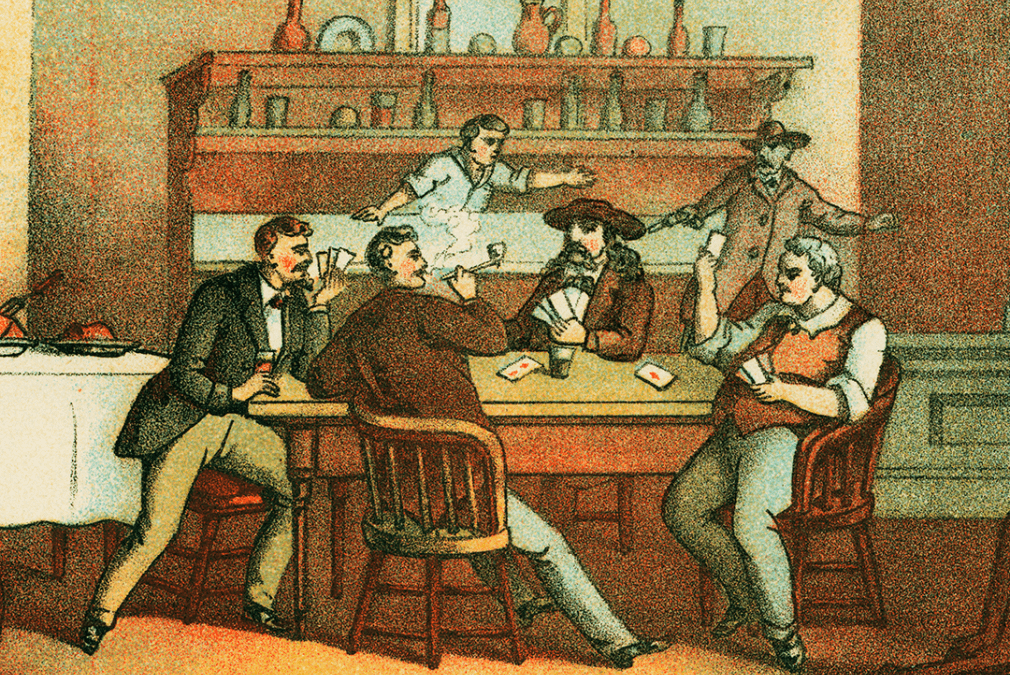Poker is a game that has captured the imagination of many. It’s a blend of skill, strategy, and a bit of luck. Over the years, poker has evolved from a simple card game to a global phenomenon. Its roots are deep, and its branches spread wide. From smoky saloons to online platforms, poker has adapted and thrived. The game has influenced cultures, created legends, and sparked debates. Understanding poker’s journey offers insights into its enduring appeal. This post delves into poker’s origins, its cultural significance, and its transformation over time. We’ll explore the key variations that have emerged and the impact of technology on the game. We’ll also look at the rise of poker tournaments and the role of famous players. Legal and ethical considerations have shaped poker’s history, and we’ll examine these as well. Finally, we’ll consider how poker has influenced modern gaming culture.
Origins of Poker: How Did It All Begin?
Poker’s origins are shrouded in mystery. Some believe it began in Persia, with a game called As-Nas. Others trace it to a French game named Poque. What is clear is that poker has always been a game of strategy and skill. It spread across continents, evolving with each culture it touched. The game we know today took shape in America. Riverboats on the Mississippi were the first venues for poker games. Here, it gained popularity among gamblers and traders. The game was simple, yet captivating. Players bet on the value of their hands, using a standard deck of cards. Bluffing became an art, adding a psychological edge to the game. As poker spread, it adapted to local customs and rules. This adaptability is a key reason for its enduring appeal. Poker’s origins may be debated, but its impact is undeniable. It laid the foundation for a game that continues to captivate players worldwide.
The Role of Poker in American Saloon Culture
In America, saloons were more than just places to drink. They were social hubs, where people gathered to relax and unwind. Poker found a natural home in these establishments. The game was easy to set up and required minimal equipment. It attracted a diverse crowd, from cowboys to businessmen. Saloons provided a lively backdrop for poker games. The clinking of glasses, the murmur of conversations, and the shuffle of cards created an atmosphere of excitement. Poker games often lasted for hours, with players vying for the pot. The stakes varied, but the thrill of the game was constant. Saloons also played a role in the evolution of poker. New variations emerged as players experimented with rules and strategies. The game became a test of wits and nerve. Winning required more than just a good hand; it required skill and intuition. Poker’s presence in saloons cemented its place in American culture. It became a symbol of the Wild West, embodying the spirit of adventure and risk.
Key Variations of Poker Through History
Poker’s adaptability is one of its greatest strengths. Over time, numerous variations have emerged. Each offers a unique twist on the classic game. Texas Hold’em is perhaps the most famous. It gained popularity for its strategic depth and fast-paced action. Players receive two cards, with five community cards dealt face-up. The goal is to make the best five-card hand. Omaha is another popular variant. It shares similarities with Texas Hold’em but adds complexity. Players receive four cards and must use two in their final hand. Seven-Card Stud was once the dominant form of poker. It requires patience and keen observation. Players receive seven cards, with the best five-card hand winning. Razz is a lowball variant, where the lowest hand wins. It challenges players to think differently about their strategy. Each variation has its own rules and nuances. This diversity keeps the game fresh and engaging. Players can choose a variant that suits their style and preferences.
Influence of the Wild West on Poker’s Popularity
The Wild West was a time of exploration and adventure. Poker thrived in this environment. It was a game that matched the spirit of the era. Cowboys, outlaws, and pioneers all played poker. It was a way to pass the time and test one’s mettle. The game became synonymous with the Wild West. Stories of high-stakes games and legendary bluffs became part of the lore. Poker games were often held in saloons, adding to the mystique. The Wild West also contributed to poker’s image as a game of risk and reward. Players had to rely on their wits and instincts. Winning required more than just luck; it required courage and cunning. The game’s association with the Wild West helped cement its place in American culture. It became a symbol of the frontier spirit. Poker’s popularity grew as tales of the Wild West spread. The game’s appeal transcended the era, capturing the imagination of future generations.
Transition from Traditional Poker to Online Platforms
The advent of the internet brought significant changes to poker. Online platforms revolutionized the way the game was played. Players could now compete from the comfort of their homes. This accessibility attracted a new audience. Online poker offered convenience and variety. Players could choose from a wide range of games and stakes. The platforms also provided tools to track performance and improve skills. Online poker rooms became virtual communities. Players from around the world could connect and compete. The transition to online platforms also introduced new challenges. Players had to adapt to a digital environment. Reading opponents became more difficult without physical cues. However, online poker also offered opportunities for growth. Tournaments with large prize pools attracted skilled players. The transition to online platforms marked a new era for poker. It expanded the game’s reach and introduced it to a global audience. The digital age has transformed poker, but its core remains unchanged.
Impact of Technology on Poker’s Evolution
Technology has played a crucial role in poker’s evolution. It has transformed the way the game is played and experienced. Online platforms have made poker accessible to a global audience. Players can compete at any time, from anywhere. This convenience has attracted a diverse range of players. Technology has also enhanced the game’s strategic depth. Advanced software tools allow players to analyze their performance. They can track statistics, review hands, and identify patterns. This data-driven approach has elevated the level of play. Live streaming has brought poker to a wider audience. Viewers can watch tournaments and learn from top players. This exposure has increased interest in the game. Mobile apps have made poker even more accessible. Players can enjoy a quick game on their smartphones. The impact of technology on poker is profound. It has expanded the game’s reach and enriched the player experience. Poker continues to evolve, driven by technological advancements.
Famous Poker Players and Their Contributions
Poker has produced many legendary players. Their skills and achievements have shaped the game. Doyle Brunson is a pioneer in the world of poker. His book, “”Super/System,”” is considered a classic. It provides insights into strategy and psychology. Phil Ivey is known for his exceptional skills and versatility. He has won numerous tournaments and is respected by peers. Daniel Negreanu is a charismatic player with a keen understanding of the game. His ability to read opponents is unmatched. Chris Moneymaker’s victory in the World Series of Poker was a turning point. It inspired a new generation of players. These players have contributed to poker’s growth and popularity. They have elevated the level of competition and inspired others. Their stories are a testament to the game’s appeal. Poker is a game of skill, and these players have demonstrated that. Their contributions have left a lasting impact on the poker world.
The Rise of Poker Tournaments and World Series of Poker
Poker tournaments have become a major part of the game. They offer players a chance to compete for large prizes. The World Series of Poker (WSOP) is the most prestigious tournament. It attracts players from around the world. The WSOP has grown significantly since its inception. It features a wide range of events and games. The main event is a highlight, with a massive prize pool. Winning the WSOP is a dream for many players. It represents the pinnacle of poker achievement. Tournaments have also contributed to poker’s popularity. They provide a platform for players to showcase their skills. Televised events have brought poker to a wider audience. Viewers can watch the action unfold and learn from top players. The rise of poker tournaments has elevated the game’s status. It has created opportunities for players and increased interest in the game. Poker tournaments continue to be a driving force in the poker world.
Legal and Ethical Considerations in Poker’s History
Poker’s history is intertwined with legal and ethical considerations. The game’s association with gambling has led to debates and regulations. In some regions, poker is seen as a game of skill. In others, it is classified as gambling. This distinction has legal implications. Regulations vary, affecting where and how poker can be played. Online poker has added complexity to the legal landscape. Jurisdictions have different rules regarding online gambling. Players must navigate these regulations to participate legally. Ethical considerations also play a role in poker. The game requires honesty and integrity. Cheating undermines the spirit of competition. High-profile scandals have highlighted the importance of ethics. Players and organizers must uphold standards to maintain the game’s reputation. Legal and ethical considerations continue to shape poker’s history. They influence how the game is perceived and played. Understanding these issues is crucial for anyone involved in poker.
How Has Poker Influenced Modern Gaming Culture?
Poker’s influence extends beyond the card table. It has shaped modern gaming culture in many ways. The game’s strategic elements have inspired video games. Players must think critically and make decisions under pressure. This has influenced game design and player experiences. Poker’s social aspects have also impacted gaming culture. Online platforms have created communities where players connect. This sense of camaraderie is reflected in multiplayer games. Poker tournaments have set a precedent for competitive gaming. Esports events draw inspiration from poker’s structure and format. The concept of skill-based competition is central to both. Poker’s influence is evident in the language of gaming. Terms like “”bluff”” and “”all-in”” are used in various contexts. The game’s legacy is woven into the fabric of modern gaming. Poker has left an indelible mark on gaming culture. Its principles and practices continue to resonate with players.
Conclusion
Poker’s journey is a testament to its enduring appeal. From its mysterious origins to its modern-day evolution, the game has captivated players worldwide. It has adapted to cultural shifts and technological advancements. Poker’s influence extends beyond the card table, shaping gaming culture and inspiring new generations. The game’s strategic depth and social aspects have contributed to its popularity. Legal and ethical considerations have also played a role in its history. Understanding poker’s journey offers insights into its lasting impact. As the game continues to evolve, its core principles remain unchanged. Poker is a game of skill, strategy, and psychology. It challenges players to think critically and adapt to changing circumstances. The game’s legacy is a testament to its timeless appeal. Poker will continue to captivate and inspire players for generations to come.


